Menu
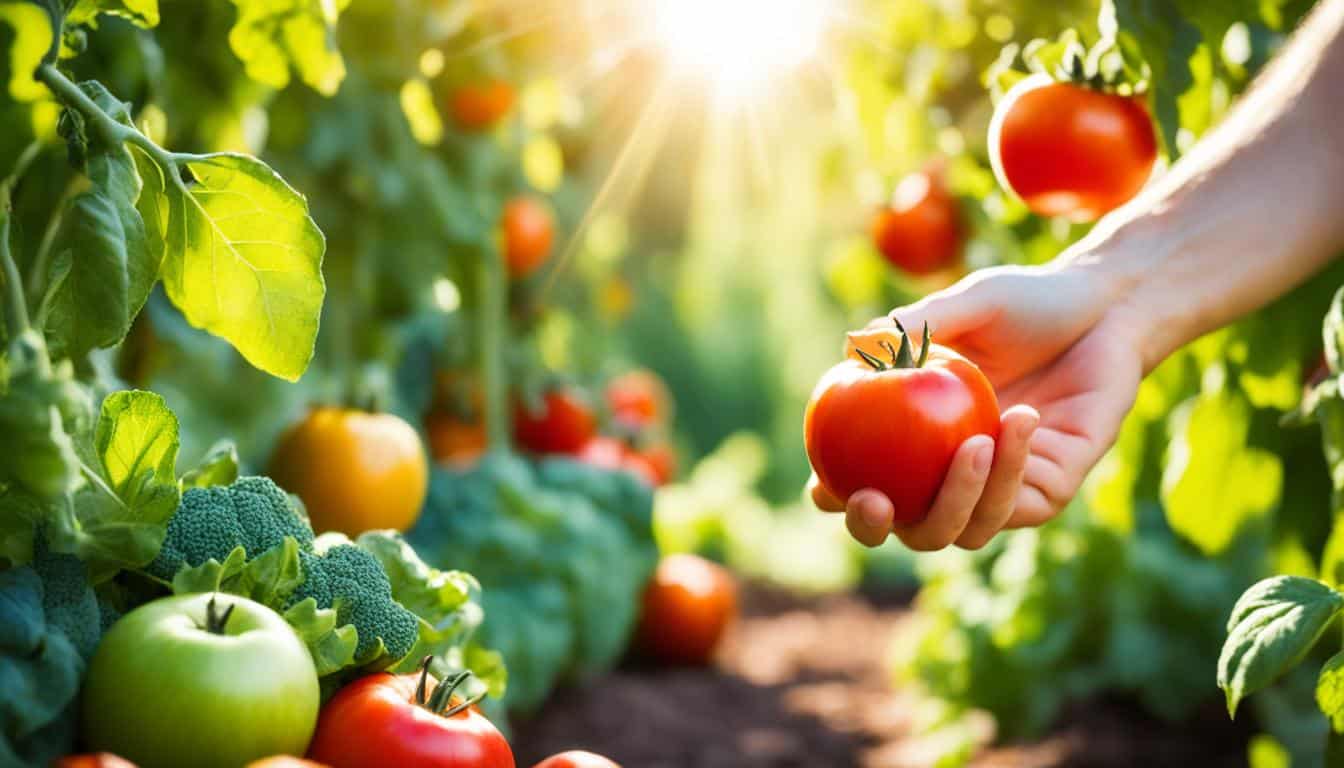
Organic meat and milk have up to 50% more omega-3 than non-organic ones. Many people wonder whether to choose organic or not when shopping. Organic farming offers a lot, like better soil and less water pollution. It also means safer homes for animals. It all helps the environment, using resources carefully to keep our planet healthy.
Organic farming doesn’t use artificial fertilisers or most pesticides. It also avoids things like irradiation and using genes to change crops or animals. Instead, it uses natural materials and methods that are kind to the land. Choosing organic isn’t just about better food for us. It means we’re looking after the earth too, with trusted ways of farming.
Organic produce comes from farms that avoid synthetic chemicals. These farms focus on caring for the environment. They use methods to keep water and soil safe and protect animal habitats. This is different from regular farming that uses a lot of artificial substances.
Sustainable farming methods keep the crops healthy without using chemicals. One way is through crop rotation. This method keeps the soil fertile and helps control pests. Green manure makes the soil better, and using natural pest control methods is key. Organic farming doesn’t use synthetic fertilisers and pesticides. This is better for the Earth and people too.
The USDA Organic certification means the produce meets strict standards set by the government. To get the USDA Organic seal, the farming, handling, and processing must follow strict rules. Put simply, when you see this seal, you know you’re buying food grown without harsh chemicals.
| Criteria | Organic | Conventional |
|---|---|---|
| Use of Synthetic Pesticides | No | Yes |
| GMO-Free | Yes | No |
| Soil and Water Conservation | Yes | No |
| Animal Welfare Standards | High | Low |
| USDA Organic Certification | Required | Not Required |
The key difference between organic and non-organic farming is in the methods used. Organic farms shun synthetic chemicals. Instead, they use natural options to protect the environment. Research shows organic food has less pesticide remains and more nutrients. For instance, organic meat and milk have more omega-3 fatty acids.
Organic produce has more antioxidants than non-organic produce. These antioxidants help fight damage to cells from oxidative stress. Research shows organic fruits and vegetables can have up to 69% more of these helpful compounds.
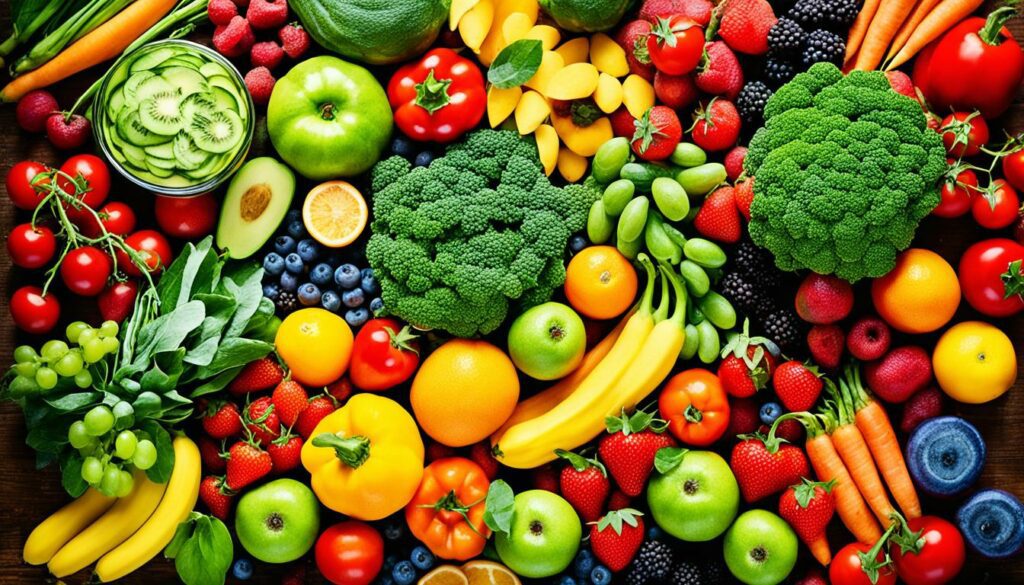
Studies find that organic crops have around 58% more antioxidants and 52% more vitamin C. The farming methods used boost the plants’ health and nutrient levels. With fewer pesticides, organic foods keep more of their natural goodness.
Choosing organic foods means a diet richer in vitamins and minerals. For example, organic dairy and meat are packed with omega-3s, iron, and vitamin E. Including organic items in your meals can lead to a healthier lifestyle.
| Component | Organic Produce | Non-Organic Produce |
|---|---|---|
| Antioxidants | Up to 69% higher | Lower levels |
| Vitamin C | 52% more | Moderate levels |
| Omega-3 Fatty Acids | Higher levels | Lower levels |
| Iron | Higher levels | Variable levels |
| Vitamin E | Higher levels | Variable levels |
| Carotenoids | Higher levels | Variable levels |
Eating organic produce helps you stay healthy by lessening contact with harmful substances in regular foods. It also has more nutrients for a better way of life.
Choosing organic means less contact with pesticides. Organic food has fewer residues. Research shows picking organic options can lower the amount of synthetic chemicals you consume, like those you find on apples, strawberries, and spinach.
Organic foods have less toxic metals, such as cadmium, than others. Cadmium is harmful and can cause health issues. Eating organic grains means you’re exposed to less of this metal, which is good for your health in the long run.
Choosing organic meat can help fight antibiotic-resistant bacteria. That’s because organic farming doesn’t use antibiotics as much. This makes organic meat safer for people worried about antibiotic misuse’s effects on health.
| Aspect | Conventional Produce | Organic Produce |
|---|---|---|
| Pesticide Residue | Higher Levels | Lower Levels |
| Toxic Metals (Cadmium) | Higher Levels | Lower Levels |
| Antibiotic Resistance | Higher Risk | Lower Risk |
In summary, going for organic produce brings many health perks, from less pesticide and metal exposure to fighting antibiotic-resistant bacteria. These facts show why organic food is a smart choice for better health.
Organic farming helps our planet a lot. It uses sustainable ways to fight soil erosion. This keeps our earth’s vital resources safe. These methods help the soil stay fertile and the ecosystem balanced.

Organic farming fights soil erosion well. Farming methods like rotating crops and not disturbing the soil too much help. This makes the soil better, so it can grow food season after season.
It’s also good at saving water. Because it doesn’t use harmful chemicals, water pollution is less. More plants and animals mean water keeps its nutrients and stays cleaner. This helps the creatures living in the water too.
Organic farming loves wildlife. It mixes old seeds with different plants and animals to create special homes. Studies show it’s better for the environment. It helps keep the soil rich and takes in carbon, helping fight climate change.
Below is a comparative table highlighting key environmental benefits of organic farming:
| Aspect | Organic Farming | Conventional Farming |
|---|---|---|
| Soil Erosion | Reduced | Higher |
| Water Conservation | Enhanced | Lower |
| Biodiversity | Greater | Lesser |
| Carbon Sequestration | Higher | Lower |
Organic farming looks at the big picture. It helps nature and our farming future. It’s good for the planet now and for those to come.
Making sure our food is safe to eat is incredibly important. Choosing organic produce can help a lot. It has to follow very strict rules in how it’s grown. This means less harmful chemicals, making it safer to eat.
For a product to be truly organic, it has to meet strict rules by places like the USDA. If it says “100% organic,” every part must be organic and show the USDA seal. But if it’s only up to 95% organic, it can say “made with organic” but can’t use the seal.
Organic produce has more of some good things in it, like antioxidants. This is because it’s grown with more natural methods. Organic animal products also tend to be better for your heart. They have more omega-3, which comes from special diets organic animals eat. Plus, organic plants have less toxic metals like cadmium.
Choosing organic produce can lower the amount of pesticides in your body. A study found that after just one week of eating organic, people had lower levels of these bad chemicals.
Buying organic might cost more, but it’s worth it. The way they’re grown is better for the environment and our health. It reduces toxins in our food, making it a smart choice for staying healthy.
Here’s a quick guide to understanding organic labels:
| Organic Label | Certification Requirements | USDA Seal |
|---|---|---|
| 100% Organic | All ingredients certified organic | Yes |
| Organic | At least 95% certified organic ingredients | Yes |
| Made with Organic | 70-94% certified organic ingredients | No |
| Organic Ingredients Listed | Less than 70% certified organic ingredients | No |
Today, supporting sustainable agriculture is key. We aim for farming methods that are kind to the environment and last long. Through organic farming, we create a balance between nature and what we grow. We focus on practices that can sustain themselves over time and lower the impact on our planet.
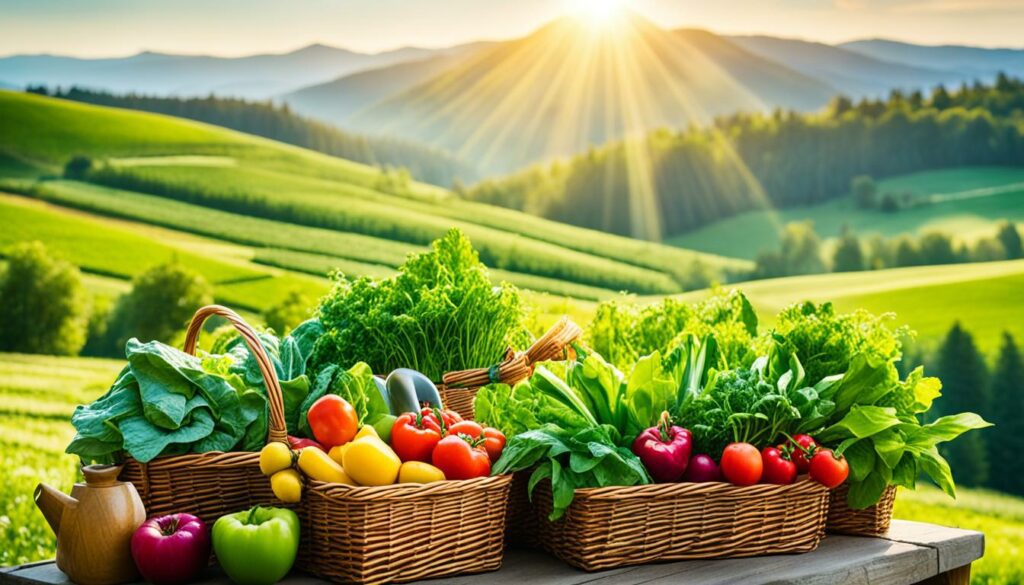
In sustainable agriculture, the goal is to use practices that keep going and improve the land. Things like changing the crops grown in a field each year, planting different crops together, and not tilling the soil too much all help. These actions make the land healthier and more productive. Farms can even fight off bad effects like soil erosion better. They need less artificial help because the soil holds onto nutrients without polluting the water.
Using these sustainable methods also drops the carbon pollution from farming. Organic farming uses less harmful chemicals, which lowers the greenhouse gas problem. Soil in organic farms stores more carbon, helping to cool the planet. Also, by farming organically, more wild plants and animals have safe spaces to live.
When we talk about organic produce, it’s key to know the difference between non-GMO and GMOs. Organics are always non-GMO. This means they are grown without any genetically modified organisms.
Genetic modification changes the DNA of plants. This is done to make them more resistant to pests or to grow quicker. Yet, this process has led to concerns about health and the environment.
Non-GMO and organic foods have key benefits. They keep their original, natural structures without any artificial changes. This makes them better for our health.
They also have fewer chemical residues from pesticides. This is good news for those who worry about the effects of toxic chemicals. Studies have found that organic grains, for example, have less cadmium, which is very good for health.
Organic farming is also better for the earth. It helps keep the soil and water clean, lessens pollution, and ensures healthier conditions for the animals that live on farms. This creates a positive cycle for the environment.
However, choosing organic comes at a higher cost. This is because it is more expensive to farm organic foods. Nevertheless, this choice supports our health and the planet. It makes the extra cost worth it for many people.
Organic livestock farming is more than just animal care. It ensures humane treatment and helps keep our planet safe. Animals live in better conditions, which is good for them and the environment.
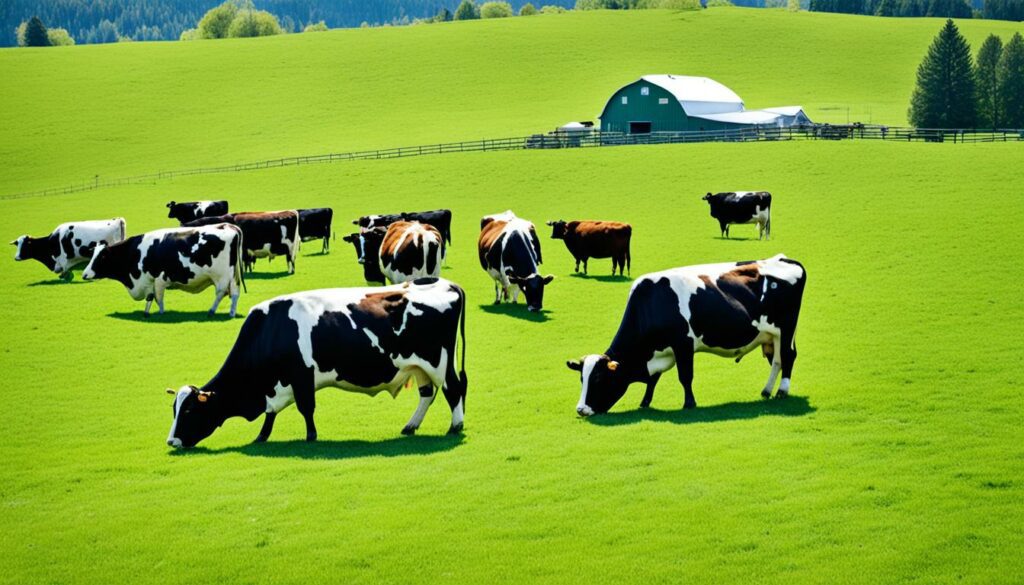
In organic farming, animal welfare is a top priority. Unlike in factory farms, animals are not kept in small spaces. Organic methods allow them to roam freely in natural areas. This not only makes the animals happy, but it also helps the environment by increasing biodiversity and keeping the soil healthy. The USDA Organic certification ensures farms follow rules to protect our planet.
Organic livestock get special organic feed. This food is grown without chemicals. It’s a rule that over 80% of their feed is organic. Because of this, the animals get healthy and natural food. This leads to high-quality products like organic eggs and milk. They are better for us because they contain more omega-3.
Organic farming uses fewer antibiotics. Unlike some farms, they avoid giving animals a lot of medicine. This is important because too many antibiotics can make them less effective over time. The meat, milk, and eggs from organic farms are safer to eat. Studies also show that animals on these farms are generally healthier.
Choosing organic farming is good for animals, nature, and people’s health. It makes the world a better place.
Buying local produce supports fresh organic food and local economies. The 2008 Farm Act defines a product as local if it’s bought within 400 miles or in-state. Local buying cuts down on long-distance transport’s carbon footprint. It also means fresher food that’s better for you and the planet.
The organic food market is growing fast, led by sales in fruits and vegetables. Even though organic foods cost more, their benefits are worth it. More people are choosing farmers’ markets, which have tripled in the last ten years. This shows a growing demand for fresh, safe-to-eat food.
Many now join Community-supported agriculture (CSA) by buying shares in local farms. This guarantees them fresh produce and a closer tie with local farmers. Through CSAs, people help support local agriculture while getting healthier food.
Farm-to-school programs are also picking up, adding local foods to school, hospital, and uni menus. This helps provide healthy meals to students and patients while supporting local farmers’ livelihoods. So, eating and sourcing local is good for the economy, the environment, and public health.
| Benefits | Local Produce | Community-Supported Agriculture |
|---|---|---|
| Environmental Impact | Reduces carbon footprint | Promotes organic farming |
| Economic Support | Boosts local economies | Direct financial support for farmers |
| Health Benefits | Fresh, peak-ripeness produce | Access to chemical-free foods |
| Community Relations | Strong producer-consumer bonds | Community involvement in agriculture |
Choosing local produce and being part of community-supported agriculture isn’t only good for our health. It also helps local communities thrive. This decision leads to a healthier environment, stronger local economies, and happier communities.
Going organic means you try to eat without pesticides. This is a big win for families, especially those with kids or mums-to-be. Eating foods with fewer man-made chemicals is better for your health.
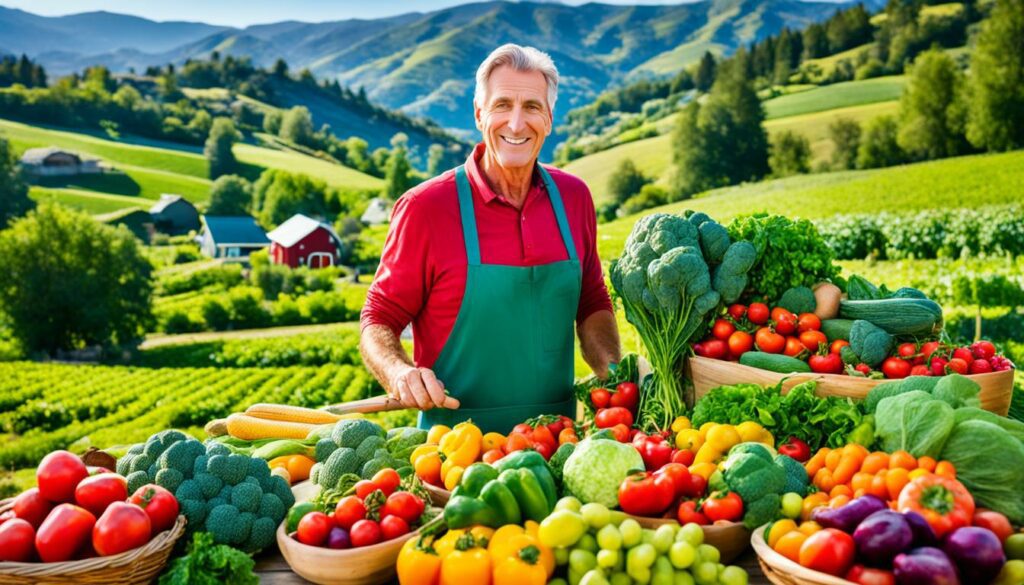
Organic farms use natural pesticides from plants or minerals. These are usually less harmful than the stuff made in labs. Organic farming aims to keep our bodies free from too many chemicals. They work in harmony with nature.
On the other hand, traditional farms use a lot of synthetic pesticides. These can be very bad for our health. But remember, even organic food can have some pesticide in it, although much less. Look for the label “pesticide-free” to be sure there are none.
Using pesticides can really hurt our health. Research shows a link to some cancers such as leukaemia and breast cancer. Kids and pregnant women are most at risk. They might have problems because of these chemicals.
Eating organic and pesticide-free lowers these health risks. Organic foods have less dangerous metals like cadmium. They also offer more antioxidants, which are good for us.
If you see the USDA organic seal, it means the food is at least 95% organic. This seal shows that the food has passed strict rules. It checks for synthetic pesticides and other harmful substances.
Choosing organic farming is better for your health. It’s a good choice, especially for families. It helps avoid the bad health effects linked to pesticides.
Eating organic food is often praised for its organic taste. This taste comes from how it’s grown and being very fresh. Because there are no preservatives, fresh organic foods keep their natural flavours and nutrients.
Organic produce tastes better because of healthy soil. Organic farms focus on soil health using natural fertilisers and crop rotation. This makes the produce richer in nutrients and more flavourful.
Studies consistently show organic taste is real. A 2016 European study found organic meat and milk are 50% higher in some nutrients. This makes them taste different. The same goes for organic fruits and vegetables, which are often said to taste more intense than non-organic ones.
| Feature | Organic Produce | Conventional Produce |
|---|---|---|
| Texture | Crisp, fresh | Often less firm |
| Flavour | Rich, robust | Typically milder |
| Nutrition | Higher in essential nutrients | Variable, often lower |
| Preservatives | None | May contain preservatives |
| Environmental Impact | Low, sustainable methods | Higher, due to synthetic inputs |
This table shows how organic and non-organic food differ. The use of synthetic pesticides is avoided in organic farming. This makes organic food better tasting and healthier. This is why people choose fresh organic foods despite the cost.
Choosing organic supports sustainable farming. It shows a commitment to keeping food natural and healthy. This reflects a choice for overall well-being through what we eat.
Choosing organic isn’t only good for your health. It also helps local economies grow. When you buy organic, you support local farms. This helps local economies in many ways. For instance, it leads to more jobs and aids broader economic progress.

By buying organic, you back local farmers. Their income rises because organic foods sell at premium prices. This has positive effects, like reducing poverty rates. One study even noted a 1.3% dip in poverty and a $2,000 rise in average income.
These benefits go beyond just farmers. They help build a strong agricultural sector that can stand on its own.
Money spent on organic food stays local. It loops back to benefit everyone in the community. This strengthens local economies by creating new jobs.
Organic farming is also better for the planet. It lessens the need for fossil fuels and reduces harmful inputs.
Organic farming is good for nature and our health. But, there are many hurdles. It’s important to know these challenges if you want to make a switch to organic or improve how you farm organically.
Organic farming tends to cost more. This is because methods like mulching, cover cropping, and weeding by hand take longer and need more work. For example, organic farmers don’t use synthetic herbicides. This means they do more manual work and pay more attention to weed management.
Using chemical pesticides is a no-go in organic farming. Instead, farmers rely on nature’s help, planting certain plants beside crops and using things like neem oil. While this is better for the environment, it does mean more time watching and helping crops. This all leads to higher costs.
Getting certified as an organic farm can be tough. It means following strict rules, getting checked often, and dealing with a lot of paperwork. Overcoming these challenges is essential if you want to sell your products as organic and get into specific markets. Keeping the soil healthy without synthetic fertilisers is vital. It involves things like using compost, well-rotted manure, and cover cropping, but it adds to the work and the cost.
Finding your place in the market is not easy. You have to be good at marketing and work closely with local sellers. Also, using approaches like Integrated Pest Management (IPM) and practices that help the environment, such as no-till farming, require learning, training, and money at the start. Making these steps is crucial for the health and long-term sustainability of your soil.
| Organic Farming Practice | Conventional Farming Practice | Impact |
|---|---|---|
| Mulching, Cover Cropping | Synthetic Herbicides | Higher Labour Costs |
| Natural Pest Control (e.g., Neem Oil) | Chemical Pesticides | Frequent Monitoring Required |
| Compost, Manure | Synthetic Fertilisers | Improved Soil Health, Higher Costs |
Organic farmers must think broadly to reach more markets. Places like farmers’ markets and the internet are good. But, to be successful, farmers need to be inventive in their marketing. They also need strong and dependable ways to get their produce to customers. Offering regular education and workshops about sustainable farming helps the farming community to be better at what they do. This leads to a more sustainable future for organic farming.
Understanding organic certification is key for those concerned about their food. In the US, the USDA organic label shows something is truly organic. This label means a product meets very strict standards of organic farming.
The USDA organic label indicates genuine organic products. Foods must meet the high standards set by the USDA to use this label. Farms and businesses go through tough checks every year by certified inspectors to keep their organic status.
On top of yearly checks, they can be visited anytime, and their products can be tested. This proves the USDA is serious about maintaining the quality of organic products. Thanks to the Strengthening Organic Enforcement rule, this oversight is even stricter now.
It’s important for shoppers to understand what the USDA organic seal means. When you see this seal, you know the product is mostly made from organic ingredients, 95% organic to be exact. It also tells you that the items were made following certified organic methods. Farms and companies that are certified must keep detailed records and go through checks to prevent fraud.
The National Organic Program keeps a database where you can check the latest on certified organic businesses. This means greater transparency for those looking to buy organic. The USDA organic label is helping more consumers trust that they are buying good, honest food.
Organic produce has a positive impact on the world. It supports sustainable farming. This means using methods that protect the land and water.
It’s better for us too. Organic food is full of healthy nutrients. It often has more vitamins and good stuff than non-organic food.
Organic produce is farmed in a special way. This farming looks after the earth and the animals. It does not use artificial chemicals.
For example, it avoids synthetic fertilisers and most pesticides. It also skips things like irradiation and genetic engineering.
Organic farming uses smart techniques. It uses crop rotation to keep the soil healthy. This is where different crops grow in the same field at different times.
It also uses natural ways to control pests. For example, introducing helpful insects that eat the harmful ones.
USDA Organic Certification means a food is pure. It shows the food has met certain high standards. When you see the USDA Organic seal, you can trust the food is truly organic.
Organic and non-organic foods are very different. Non-organic food may have synthetic chemicals. But organic food is natural and good for the earth.
Organic farming methods protect the environment. They also make sure food is safe to eat.
Organic food is packed with nutrients. It has more vitamins and minerals. This is because the soil where it grows is healthy.
Also, organic food has less bad stuff in it. So, it’s better for our health.
Eating organic means less exposure to harmful chemicals. It offers food with fewer toxins. This is good for our overall health.
Also, organic food has less of the bad metals that can be in the soil. So, it’s safer for us, especially children and pregnant women.
Organic farming is kind to the planet. It helps keep the water and soil clean. This is good for animals and plants.
Farms that use organic methods are also home to more kinds of wildlife. They help fight climate change by storing carbon in the soil.
Organic food is grown in natural ways. It focuses on keeping the soil and water healthy. This means less bad stuff in the food we eat.
Strict rules in organic farming stop the use of harmful chemicals. This makes organic food a safer choice for us.
It helps our planet in the long run. Sustainable farming cares for the earth. It uses less energy and helps keep the air clean.
This kind of farming makes sure there’s enough food for the future. It doesn’t use up all the earth’s resources today.
Non-GMO means the food is free from genetic changes. This ensures natural processes are used. It avoids risks linked with altering genes.
Choosing non-GMO organic foods means a safer and more stable food supply. This is important for health and the environment.
Organic animal farming is good for the animals and us. They have better living conditions. They eat natural foods without harmful chemicals.
The food from these animals is healthier too. It has more of the good fats we need. So, it’s a better choice for our meals.
Local organic food is good for our local area. It supports local farmers and jobs. It also cuts down on pollution from transport.
This food is picked at its best. It’s fresh and full of flavour. And it’s good for the environment too.
Not having pesticides in our food is safer. This is especially true for kids and pregnant women. It reduces the risk of harmful chemicals.
Organic farms use natural ways to protect crops. These methods are less toxic. So, they are better for our health.
Yes, many people think organic food tastes better. Its fresh quality and natural farming practices make the difference. The lack of preservatives helps too.
The natural path to grow organic food makes it more flavoursome. This is why many enjoy its taste.
Buying organic helps our local economy. It supports local farmers. This leads to more jobs in our community.
It also means the money stays nearby. This is good for everyone and the planet too.
Organic farming faces some challenges. It can cost more to produce food this way. This is because it’s all about being natural which takes more time and effort.
Getting certified as organic is another hurdle. So is finding the right places to sell the organic products. But these steps are important to make sure the food is truly organic.
Look for the USDA Organic label. This certifies the product meets strict organic standards. It’s a sure way to know you are getting real organic food.
Understanding different labels is key. Authentic organic products need to have at least 95% organic ingredients to show this seal.